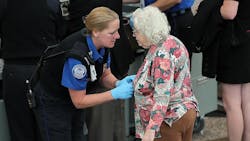Air travel would be safer if we allowed knives, lighters and liquids, according to Kip Hawley, who was in charge of the Transportation Security Administration during George W. Bush’s second term, in a Wall Street Journal essay published last Saturday.
“Preventing terrorist attacks on air travel demands flexibility and the constant reassessment of threats,” he writes, describing a system made too brittle by enforcing regulations rather than managing risks. “It also demands strong public support, which the current system has plainly failed to achieve.”
Hawley proposes a few baggage-related changes that he believes would make the system better and certainly provide the agency with some sorely needed public buy-in. Here’s one big change in his words:
- Eliminate baggage fees: Much of the pain at TSA checkpoints these days can be attributed to passengers overstuffing their carry-on luggage to avoid baggage fees. The airlines had their reasons for implementing these fees, but the result has been a checkpoint nightmare. Airlines might increase ticket prices slightly to compensate for the lost revenue, but the main impact would be that checkpoint screening for everybody will be faster and safer.
Baggage fees aren’t the TSA’s call, of course, but the idea sounds good to me. The airlines? Probably not so much. According to the U.S. Department of Transportation, airlines took in $2.6 billion in baggage fees last year. What's more, while the big airlines get hundreds of millions in fees, the fees add up to a large percentage of total operating revenue for smaller airlines.
Then again, would we all pay a few bucks more to get rid of the fees? According to the DOT, 637 million people flew in 2011. That comes out to a little more than $4 per person.
Hawley also suggests “no more banned items” (with the obvious exception of guns and explosives) and “allow all liquids.”
Each TSA measure has a reason – and each one provides some security value. “But taken together,” Hawley writes, “they tell the story of an agency that, while effective at stopping anticipated threats, is too reactive and always finds itself fighting the last war.”
As I read the essay, I would have thought we’d finally get to keep our shoes on. I’ll let you read why that turns out to not be a good idea.

